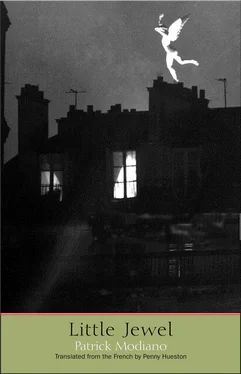It was nine o’clock in the evening. I told him I had to go home. He said that, next time, if it suited me, he would invite me for dinner. And he would give me a lesson in Persian of the plains.
He walked with me to the metro. I didn’t recognise the Porte d’Orléans, and yet, until I was sixteen, it was where I used to arrive every time I came to Paris. Back then, the bus I took from Fossombronne-la-Forêt stopped in front of La Rotonde café.
He was still speaking to me about Persian of the plains. It was like Finnish, he said. It was also a pleasant language to listen to. You could hear the rustle of wind in the grasses and the murmur of waterfalls.
IN THE BEGINNING, I was aware of a funny smell on the stairs. It came from the red carpet, which must have been decomposing. You could already see the wooden steps coming through in a few spots. So many people had climbed up and down these stairs, back when this building was a hotel…The staircase was steep and led directly from the covered entrance on the street. I knew my mother had lived in this hotel: the address was on my birth certificate. One day, when I was looking through the classifieds to find a room to rent, I was surprised to come across the address under the heading STUDIO RENTALS.
I turned up at the appointed time. A man of about fifty with a ruddy complexion was waiting for me on the pavement. He took me up to the first floor and showed me a bedroom with a little bathroom. He insisted I pay three months’ rent in cash. Fortunately, I still had enough money on me. He took me to a café, on the corner of Boulevard de Clichy, to fill in and sign the papers. He explained to me that the hotel had been closed down and that the rooms had become studios.
‘My mother lived in this hotel…’
I heard myself say the sentence slowly and was startled. What had got into me?
‘Oh, really?’ he said distractedly. ‘Your mother?’ He was of an age to have known her. I asked if he had been in charge of the hotel in the past. No. He had bought it last year with some business partners and they had done various renovations.
‘You know,’ he said, ‘it wasn’t such a glamorous hotel.’
On my first night there, I imagined that perhaps my mother had lived in the room I was in. Things had suddenly fallen into place on the evening I was looking for a room to rent, when I saw the address in the newspaper: 11 Rue Coustou. For a little while before then, I would open the old biscuit tin, flick through the diary and address book, look at the photos…But I confess that I had never previously opened the tin, or else, if I did open it, I never had the urge to focus on what seemed to be nothing more than old scraps of paper. Ever since I was a child, I’d kept this tin with me; like Tola Soungouroff’s painting, it had always been part of the furniture and accompanied me everywhere. I even stored some cheap jewellery in there, the sort of trinkets you keep for ages and don’t pay much attention to. And, if you happen to lose them, you realise that you were never aware of certain details about them. So I didn’t remember what the frame of Soungouroff’s painting looked like. And if I had lost the biscuit tin, I would have forgotten that on the lid there was a torn sticker on which you could still read: LEFÈVRE-UTILE. One has to beware of so-called witnesses.
I had come back to the beginning, since that address was on my birth certificate as my mother’s place of residence. And I had probably lived there, too, early in my life. One evening, when Moreau-Badmaev was walking me home, I told him my story and he said, ‘So, you’ve found your old family home.’
And we both burst out laughing. The entrance is concealed by honeysuckle; the gate has stayed shut for so long that weeds have grown on the other side and you can only open it a bit to squeeze through. In the depths of the plain, under the light of the moon, was the castle of our childhood. With a candelabra in our hand, we walk through the blue living room and the picture gallery lined with portraits of our ancestors. Nothing has changed; everything has stayed in exactly the same spot, under a layer of dust. We climb up the main staircase. At the end of the corridor, we finally arrive at the children’s bedroom.
Moreau-Badmaev was having a laugh, describing my return to the family estate as it might have happened in another life. But the window of my bedroom looked out onto Rue Puget, a short street, much narrower than Rue Coustou and making a sort of triangle with it. My bedroom was at the apex of the triangle. There were no shutters or curtains. At night, the illuminated sign on the garage further down Rue Coustou flashed red and green on the wall above my bed. It didn’t worry me. On the contrary, I found it comforting. Someone was watching over me. Perhaps the red and green flashes dated back a long time, to when my mother and I were in the bedroom, lying on the same bed, trying to get to sleep, as I was now. The lights went on and off, on and off, and I found it soothing as I slipped off to sleep. Why had I rented this room, when I could have chosen one in another neighbourhood? But it wouldn’t have had red and green flashes, as regular as heartbeats, which I ended up telling myself were the only traces left of the past.
EACH DAY I had to go over to the Bois de Boulogne district, to the home of some rich people whose daughter I looked after. I’d landed the job one afternoon when, as a last resort, I fronted up at the Taylor Agency, an employment agency that I chose at random from the pages of a telephone directory.
A red-headed man with a moustache and wearing a glen plaid suit showed me into a dark-panelled office. He told me to take a seat. I found the courage to tell him that it was the first time I’d tried out for this sort of job.
‘Don’t you want to continue with your studies?’
His question took me aback. I told him I wasn’t enrolled in any course.
‘When I saw you come in, I assumed you were a student.’
He pronounced the word with such respect that I wondered what wonderful things it evoked for him and I was truly sorry that I wasn’t a student.
‘I might have a job for you — three hours a day — a babysitting job.’
I immediately had the impression that no one ever made an appointment at the Taylor Agency and that this redheaded man spent long, lonely afternoons sitting at his desk, daydreaming about female students. On one of the walls, to my left, was a large sign on which were precisely drawn pictures of men dressed as maître d’s and as chauffeurs, and of women in what looked like nannies’ and nurses’ uniforms. On the bottom of the sign, written in large black letters: THE ANDRÉ TAYLOR AGENCY.
He smiled at me. He told me that the sign was from his father’s era and that I would certainly not need to wear a uniform. The people who were to interview me lived near Neuilly and were looking for someone to take care of their little girl each afternoon.
The first time I went to their place, it was a rainy day in November. I hadn’t slept the night before and I wondered what they would think of me. The man at the agency had said they were quite young, and he’d given me a piece of paper with their name and address: Valadier, 70 Boulevard Maurice-Barrès. It had been raining all morning; it made me want to leave my room, leave Paris. As soon as I had a bit of money, I would head for the Midi, or even further, down south. I tried to hang on to this plan, and not let myself sink into despair. I had to tread water, be patient. The only reason I contacted the Taylor Agency was as a last-ditch effort to persevere. Otherwise, I would never have had the courage to leave my room or my bed.
I could still picture the sign on the wall of the agency. The red-headed man would have been shocked if I had told him that I would not have minded wearing a nanny’s uniform or, especially, a nurse’s uniform. A uniform would have helped me to summon my courage and my endurance, the way a corset helps you to walk with an upright posture. In any case, I had no choice. Until then, I’d only been lucky enough to find two temporary jobs as a salesgirl, first at the department store Les Trois Quartiers, and then in a perfume shop on the Grands Boulevards. The Taylor Agency might find me a more secure job. But I had no illusions about my chances. I was not a performer like my mother had been. When I lived in Fossombronne-la-Forêt, I used to work at the Auberge Verte on the Grande-Rue. A lot of customers frequented this hotel, often people from Paris. My work was not very demanding: I was either at the bar, or in the dining room, or sometimes at reception. Every evening in winter, I used to light the fire in the little wood-panelled room near the bar, where you could read the papers or play cards. I worked there until I was sixteen.
Читать дальше












